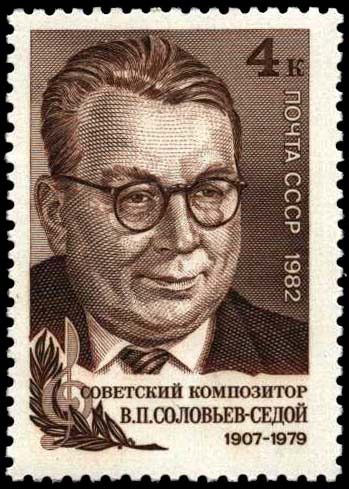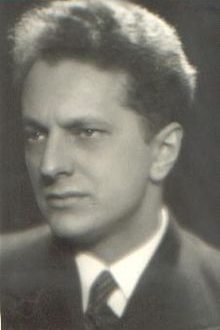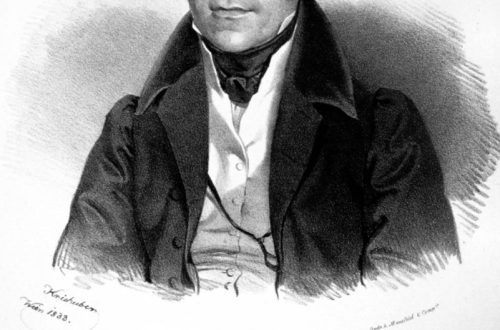
Vasily Solovyov-Sedoi |
Vasily Solovyov-Sedoi
“Our life is always rich in events, rich in human feelings. There is something to glorify in it, and there is something to empathize – deeply and with inspiration. These words contain the creed of the remarkable Soviet composer V. Solovyov-Sedoy, which he followed throughout his entire career. The author of a huge number of songs (over 400), 3 ballets, 10 operettas, 7 works for a symphony orchestra, music for 24 drama performances and 8 radio shows, for 44 films, Solovyov-Sedoy sang in his works the heroism of our days, captured the feelings and thoughts of the Soviet person.
V. Solovyov was born into a working-class family. Music from childhood attracted a gifted boy. Learning to play the piano, he discovered an extraordinary gift for improvisation, but he began to study composition only at the age of 22. At that time, he worked as a pianist-improviser in a rhythmic gymnastics studio. Once, the composer A. Zhivotov heard his music, approved it and advised the young man to enter the recently opened musical college (now the Musical College named after MP Mussorgsky).
After 2 years, Soloviev continued his studies in the composition class of P. Ryazanov at the Leningrad Conservatory, from which he graduated in 1936. As a graduation work, he presented a part of the Concerto for Piano and Orchestra. In his student years, Solovyov tries his hand at various genres: he writes songs and romances, piano pieces, music for theatrical performances, and works on the opera “Mother” (according to M. Gorky). It was a great joy for the young composer to hear his symphonic picture “Partisanism” on the Leningrad radio in 1934. Then under the pseudonym V. Sedoy {The origin of the pseudonym has a purely family character. From childhood, the father called his son “gray-haired” for the light color of his hair.} his “Lyrical Songs” came out of print. From now on, Solovyov merged his surname with a pseudonym and began to sign “Soloviev-Seda”.
In 1936, at a song contest organized by the Leningrad branch of the Union of Soviet Composers, Solovyov-Sedoy was awarded 2 first prizes at once: for the song “Parade” (Art. A. Gitovich) and “Song of Leningrad” (Art. E. Ryvina) . Inspired by success, he began to work actively in the song genre.
The songs of Solovyov-Sedogo are distinguished by a pronounced patriotic orientation. In the prewar years, “Cossack Cavalry” stood out, often performed by Leonid Utesov, “Let’s go, brothers, to be called up” (both at A. Churkin station). His heroic ballad “The Death of Chapaev” (Art. Z. Aleksandrova) was sung by soldiers of international brigades in Republican Spain. The famous anti-fascist singer Ernst Busch included it in his repertoire. In 1940 Solovyov-Sedoy completed the ballet Taras Bulba (after N. Gogol). Many years later (1955) the composer returned to him. Revising the score again, he and the scriptwriter S. Kaplan changed not only individual scenes, but the entire dramaturgy of the ballet as a whole. As a result, a new performance appeared, which acquired a heroic sound, close to Gogol’s brilliant story.
When the Great Patriotic War began, Solovyov-Sedoy immediately put aside all the work he had planned or started and devoted himself entirely to songs. In the autumn of 1941, with a small group of Leningrad musicians, the composer arrived in Orenburg. Here he organized the variety theater “Hawk”, with which he was sent to the Kalinin Front, in the Rzhev region. During the first month and a half spent at the front, the composer got to know the life of Soviet soldiers, their thoughts and feelings. Here he realized that “sincereness and even sadness can be no less mobilizing and no less necessary for fighters.” “Evening on the roadstead” (Art. A. Churkin), “What are you yearning for, comrade sailor” (Art. V. Lebedev-Kumach), “Nightingales” (Art. A. Fatyanova) and others were constantly heard at the front. comic songs were also less popular – “On a sunny meadow” (art. A. Fatyanova), “Like beyond the Kama across the river” (art. V. Gusev).
A military storm has died down. Solovyov-Sedoy returned to his native Leningrad. But, as in the war years, the composer could not remain long in the silence of his office. He was drawn to new places, to new people. Vasily Pavlovich traveled a lot around the country and abroad. These trips provided rich material for his creative imagination. So, being in the GDR in 1961, he wrote, together with the poet E. Dolmatovsky, the exciting “Ballad of Father and Son.” The “Ballad” is based on a real incident that took place at the graves of soldiers and officers in West Berlin. A trip to Italy provided material for two major works at once: the operetta The Olympic Stars (1962) and the ballet Russia Entered the Port (1963).
In the post-war years, Solovyov-Sedoy continued to focus on songs. “A soldier is always a soldier” and “The Ballad of a Soldier” (Art. M. Matusovsky), “March of the Nakhimovites” (Art. N. Gleizarova), “If only the boys of the whole earth” (Art. E. Dolmatovsky) won wide recognition. But perhaps the greatest success fell on the songs “Where are you now, fellow soldiers” from the cycle “The Tale of a Soldier” (Art. A. Fatyanova) and “Moscow Evenings” (Art. M. Matusovsky) from the movie “In days of the Spartakiad. This song, which received the first prize and the Big Gold Medal at the International Competition of the VI World Festival of Youth and Students in 1957 in Moscow, gained wide popularity.
Many excellent songs were written by Solovyov-Sedoy for films. Coming off the screen, they were immediately picked up by the people. These are “Time to go-road”, “Because we are pilots”, sincere lyrical “On the boat”, courageous, full of energy “On the road”. The composer’s operettas are also imbued with bright song melody. The best of them – “The Most Treasured” (1951), “Eighteen Years” (1967), “At the Native Pier” (1970) – were successfully staged in many cities of our country and abroad.
Welcoming Vasily Pavlovich on his 70th birthday, composer D. Pokrass said: “Soloviev-Sedoy is a Soviet song of our time. This is a wartime feat expressed by a sensitive heart… This is a struggle for peace. This is a tender love for the motherland, hometown. This, as they often say about the songs of Vasily Pavlovich, is an emotional chronicle of the generation of Soviet people, which was tempered in the fire of the Great Patriotic War … “
M. Komissarskaya




